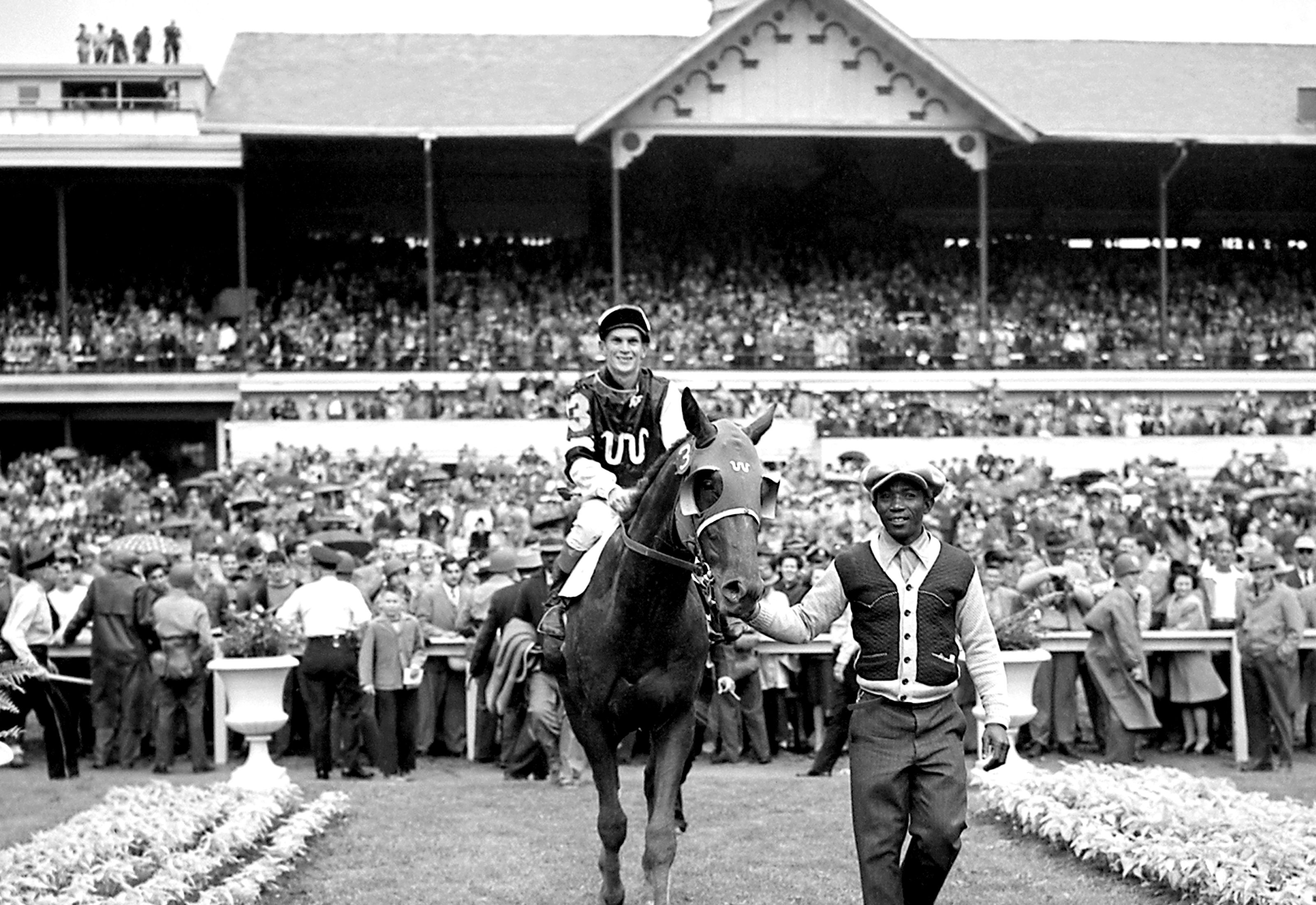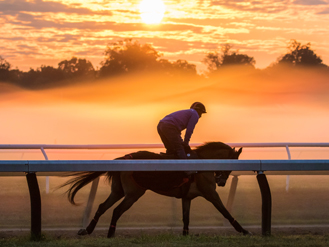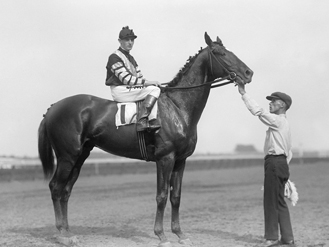Assault: Against all odds

Seventy-five years ago, Assault proved the doubters wrong by sweeping the Triple Crown in a style all his own
By Brien Bouyea
Hall of Fame and Communications Director
America’s seventh Triple Crown winner was the first to be bred and foaled beyond the borders of the blueblood breeding ground of Kentucky. In the southern part of Texas, at the sprawling King Ranch — a farm with more acreage than the state of Rhode Island — Assault entered the world on March 26, 1943. There were no prognostications of greatness for the smallish chestnut colt, especially after he stepped on something sharp, purportedly a surveyor’s stake, which pierced his right front foot and resulted in deformation and a permanent limp at a walk or trot.
Assault was a son of 1936 Kentucky Derby and Preakness Stakes winner Bold Venture out of the unraced Equipoise mare Igual. Both Bold Venture and Igual were small in stature, explaining Assault’s height of barely 15.2 hands and weight of less than 1,000 pounds. With unimposing physical traits and a significant foot injury, Assault seemingly had the deck stacked against him.
King Ranch was established in 1853 by Richard King and Mifflin Kenedy. While building their ranching business and supplying the Confederacy with beef and horses, the partners also operated a steamboat business, which they bought from the U.S. government after the Mexican War. King and Kenedy sold the steamboat operation in 1874 to focus exclusively on ranching. The men eventually divided the land but remained partners. King continued to expanded his property until he died in 1885 with holdings of 500,000 acres. Following his death, King’s widow asked Robert Kleberg II, an attorney, to take over management of King Ranch. Kleberg II married Alice Gertrudis King, the youngest daughter of the land baron, a year later. Prior to his death in 1932, Kleberg II turned the King Ranch operation over to his son, Robert Kleberg, Jr.
Four years later, Kleberg, Jr. acquired King Ranch’s first thoroughbred, a stallion named Chicaro, for the purpose of improving the farm’s quarter horse line. In 1939, Kleberg, Jr. bought Bold Venture for a reported $40,000 from Morton Schwartz. Bold Venture didn’t have any notable early success as a sire in Kentucky, but Kleberg, Jr. was interested nonetheless and brought the dual-classic winner to Texas.
Bold Venture was trained by Hall of Famer Max Hirsch, a Texas native who was given the task of conditioning Assault for King Ranch. Hirsch discovered early on that Assault’s bad foot would not be a hinderance for racing.
“When he walks or trots, you’d think he was going to fall down,” Hirsch said. “I think that when the foot still hurt him, he got in the habit of protecting it, with an awkward gait, and then he kept it up. But he galloped true. There wasn’t a thing wrong with his action when he went fast."
Assault lost his first three career starts before breaking his maiden at Aqueduct on July 12, 1945. He made his stakes debut next out, finishing fifth in the East View at odds of 18-1. Sent off at odds of 71-1 in the United States Hotel Stakes at Belmont Park on Aug. 6 — the day the United States dropped an atomic bomb on Hiroshima — Assault delivered a huge upset by defeating Mist o’ Gold by a nose. The New York Times said Assault “revealed a burst of speed that enabled him to run over all the others” and “made a brilliant bid at the finish” to pay a whopping $143.20 on a $2 win wager. Assault, however, failed to replicate that form again during his juvenile season and lost his final three races following the Flash.
Troubled with an assortment of injuries early on as a 3-year-old, Assault did not make his sophomore debut until April 9, 1946. But once back on the track, Assault began to display excellent form, winning the Experimental Handicap at Jamaica and the Wood Memorial less than two weeks later. It was then off to Kentucky, where he finished fourth in the Derby Trial on a muddy track.
Four days later, Assault decimated the field in the Kentucky Derby at odds of 8-1. Jockey Warren Mehrtens found a hole along the rail at the top of the stretch and Assault rocketed past the overmatched competition. At the wire, Assault owned a whopping eight lengths on Spy Song to equal the largest winning margin in Derby history, prompting Walter Haight to write: “Assault is his name, but he looked like Murder, Inc.”
The press began calling Assault the “Clubfooted Comet.” A week after the Derby, Assault held off a late charge from Lord Boswell to win the Preakness by a neck. Back in New York for the Belmont, Assault was not favored to complete the Triple Crown sweep. Lord Boswell took more money and it looked like Assault’s magical run was about to come to an end when he stumbled out of the gate and trailed by eight lengths entering the second turn. By the time he reached the far turn, Assault was steadily improving his position. With a big stretch run, Assault pulled away to defeat Natchez by three lengths before a crowd of 43,599. Lord Boswell was fifth in the seven-horse field.
“The gold and the glory were all Assault’s,” said the New York Times. “It was a glorious day for owner Kleberg, for trainer Max Hirsch, and particularly for jockey Warren Mehrtens, the youngster from Jamaica High School, who had ridden Assault to every one of his victories.”
The only time I was worried was coming out of the gate when Assault stumbled,” Mehrtens said. “He recovered at once and we were never in difficulty again. I had more confidence this time than in either the Derby or Preakness, but I still can’t believe we won the Triple Crown.”
Said Kleberg, Jr.: “We’re deeply happy and we feel others will agree with us now that Assault is a great horse. I want particularly to compliment Max Hirsch on a great training job.”
Following the Belmont, Assault went on to win the Dwyer Stakes, Pimlico Special, and Westchester Handicap to lock up Horse of the Year and Champion 3-Year-Old Male honors. His 1946 earnings amounted to a single-year record of $424,195.
As a 4-year-old, Assault began his campaign with a blaze of glory with consecutive victories in the Grey Lag, Dixie, Suburban, Brooklyn, and Butler handicaps. He defeated Hall of Famers Stymie and Gallorette while carrying 135 pounds in the Butler, an amazing last-to-first victory under Eddie Arcaro in which Stymie carried 126 pounds and Gallorette only 117.
Injuries began to take their toll on Assault. He managed to win only three more times before being retired in 1950 with a career record of 18-6-7 from 42 starts and earnings of $675,470. Unable to produce any offspring, Assault lived the remainder of his life at King Ranch, where he died on Sept. 1, 1971, at the age of 28.
Assault was inducted into the Hall of Fame in 1964 and was ranked No. 33 by The BloodHorse among the top 100 racehorses of the 20th century.
“I never trained a better horse,” Hirsch said.

Assault (TX)
Lifespan: 1943 ̶ 1971
Pedigree: Bold Venture—Igual, by Equipoise
Breeder: King Ranch
Owner: King Ranch
Trainer: Max Hirsch
Career dates: 1945 ̶ 1950
Record: 42 starts, 18 wins, 6 seconds, 7 thirds
Earnings: $675,470
Honors:
- America’s seventh Triple Crown winner 1946
- Horse of the Year 1946
- Champion 3-Year-Old Male 1946
- Ranked No. 33 in the top 100 racehorses of the 20th century (The BloodHorse)
- Inducted into the Hall of Fame 1964
Notable:
- First horse not bred in Kentucky to win the Triple Crown
- Set single-year earnings record of $424,195 in 1946
- Won the Grey Lag, Dixie, Suburban, Brooklyn, and Butler handicaps in succession 1947




